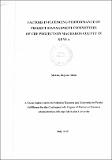| dc.description.abstract | The CDF kitty as established in 9111 parliament through the CDF Act 2003 and repealed in _o 13 has had its fair share of criticism and praise. Though it has many players in its structure, the PMCs who are the most important in the structure have been left unexamined. In the CDF Act 2013, the PMCs are at the community level hence they are the drivers of the kitty and what affects their performance affects the outlook of the fund. This study sought to determine the factors influencing their performance in the implementation and management of the CDF kitty. They are namely the origin of a project, available funding, educational qualifications and application of technical knowledge. The objectives were specifically to test the relationship between the origin of project and performance of PMC, to determine the way funding availed affects PMC performance, investigating how educational qualifications influence performance and assessing connection between application of technical knowledge and performance. The theoretical review was based on the Five Learning disciplines, the Kaizen and the Goal Setting theories. Empirical Reviews of other studies related to the study covered such areas as Community-based driven development, CDF administration, and composition, role of committees, citizen involvements, projects identification and location. The review further looked at the survey finding on poverty reduction through improved governance on CDF and how line ministries influence utilization of the funds. Conceptual as well as operational framework diagrams were applied to indicate the linkage between the variables. The study adopted a survey research design whereby data was collected using questionnaires. The sample was identified using both stratified and simple random sampling methods. The target population was 1074 while the sample size consisted of 322 respondents. The findings from the field were analysed using frequencies, percentages, tabulation as well as chi-square test. The conclusion of the study is that the origin of the projects had the least influence on PMCs' performance while available funding, educational qualification and application of technical skills were the major factors. The study recommended that further research should be done to get the influence of political decision in available funding to PM Cs; | en_US |

